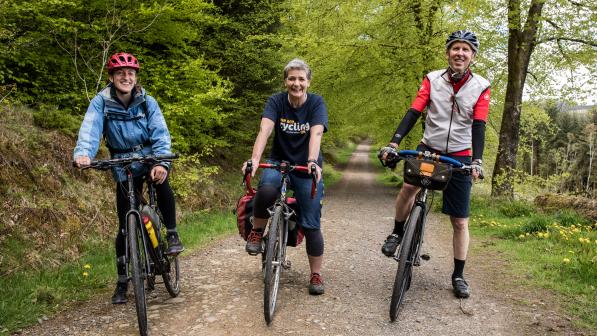Opinion: Why we need to keep the wheels moving on active travel investment in Wales

This op-ed was first published on Nation.Cymru
With the Welsh budget coming up, and the UK Government's recent modest funding boost, there’s a real opportunity for Wales to reinvest in walking, cycling and wheeling. This isn’t just about improving transport; it’s about shaping a future where people in Wales can live healthier, more connected, and more sustainable lives.
We all have experiences or awareness of NHS waiting times and delays, but walking and cycling offers another way to reduce strain on the health services we rely on. Scotland has shown that investing in walking and cycling can save around £600 million annually in healthcare costs. Beyond those benefits, this kind of investment can help revitalise our struggling high streets. Shoppers who travel by bike or by foot spend up to six times more in local shops than those who travel by car.
Beyond the savings it can bring, better access to walking and cycling stands to make our communities safer and more pedestrianised, especially for children. 22% of parents say they would walk their children to school more often if roads were safer. This isn’t just about convenience—it’s about protecting and making it easy for children to get their 60 minutes of physical activity a day, which we know has a positive effect on their health and wellbeing. Safer routes also reduce traffic congestion at school pick up and drop off, making the air our children breathe safer at the start and end of the school day.
In Wales, we all know that getting from one place to another can be tricky depending on where you live. For most bus and train journeys, the trip starts with walking or cycling. Imagine how easy getting around would be if we had a truly integrated transport system. With walking and cycling routes to bus and train stations and high-quality cycle storage at interchanges, you could also significantly reduce the amount of congestion and pollution on the roads, while also encouraging more people to use more public transport. That seamless connection between active travel and public transport has the power to create a more efficient and accessible network for everyone!
But all this must start with how we get more people walking or cycling. We know that many people are hesitant to walk or cycle due to concerns about safety, especially in areas with heavy traffic. Simple improvements, such as better crossings, dedicated bike lanes, and traffic-calming measures, can go a long way toward making roads safer. The introduction of 20mph speed limits has already shown signs of improving safety, and continuing to prioritise road safety will help ensure that everyone can feel secure while walking or cycling, regardless of age or ability. Just a few months ago, Ffion Jones’ five-year-old daughter, Nanw Wyn Jones’ was hit by a car crossing the road. Ffion believed the 20mph speed limit saved her daughter's life and that’s not the only story. Last year, a driver in Pembrokeshire said the pilot 20mph zone meant he did not hit a 12-year-old boy after he failed to spot him running across a road.
Ultimately, the case for investing in walking, cycling, and wheeling goes beyond transportation—it’s about creating healthier, more sustainable communities where everyone can move around safely and easily.
Words by Gwenda Owen, on behalf of Cycling UK, Living Streets Cymru and Sustrans Cymru
Notes to editors
- Cycling UK, the UK’s cycling charity, aims to create happier, healthier and greener lives through cycling
- For more than 140 years, we’ve been making our streets safer, opening up new traffic free routes and inspiring more people to cycle more often. For more information visit: www.cyclinguk.org
Press contact information
For more information, please contact the national Cycling UK press office www.cyclinguk.org/contact/press-and-media.
If you would like to speak to a member of the press office during working hours (0900 - 1700) please call Joshua Gill on 07879 481 284 or email [email protected]. Out of hours, call 0148 3238 315.


